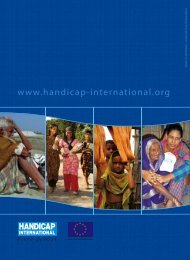Full page photo print - Harvard Law School Project on Disability
Full page photo print - Harvard Law School Project on Disability
Full page photo print - Harvard Law School Project on Disability
Create successful ePaper yourself
Turn your PDF publications into a flip-book with our unique Google optimized e-Paper software.
People with disabilities also have the right to assistance in the exercise of their registrati<strong>on</strong> and<br />
voting rights . For example, they may select a friend or family member to accompany them to the<br />
polls . The right to assistance is particularly important where registrati<strong>on</strong> and polling stati<strong>on</strong>s are<br />
not fully accessible . Service animals may also facilitate political participati<strong>on</strong> rights .<br />
In many countries around the world, organizati<strong>on</strong>s for pers<strong>on</strong>s with disabilities have played<br />
important advocacy roles to enhance the accessibility of electoral processes for all and<br />
also to raise awareness about disability issues more generally . Electoral processes present<br />
opportunities for pers<strong>on</strong>s with disabilities to raise the visibility of disability issues, to engage with<br />
political parties, and to assess the extent to which nati<strong>on</strong>al electi<strong>on</strong>s commissi<strong>on</strong>s are working<br />
to ensure access and realizing the right of people with disabilities to exercise their right to vote .<br />
Electoral processes also present opportunities for disabled people’s organizati<strong>on</strong>s to work with<br />
other civil society groups <strong>on</strong> voter awareness and educati<strong>on</strong> and <strong>on</strong> observati<strong>on</strong> and m<strong>on</strong>itoring .<br />
In this way, organizati<strong>on</strong>s for pers<strong>on</strong>s with disabilities can c<strong>on</strong>nect with other civil society groups<br />
to share informati<strong>on</strong> and advocacy goals and to learn the advocacy strategies and priorities of<br />
other groups .<br />
eXeRcise 3.2: voting Access for People with disabilities<br />
objective: To c<strong>on</strong>sider how voting processes can ensure the participati<strong>on</strong> of people with<br />
disabilities<br />
Time: 45 minutes<br />
materials: Chart paper and markers or blackboard and chalk<br />
1. discuss:<br />
Divide participants into small discussi<strong>on</strong> groups . Ask each group to discuss the following<br />
questi<strong>on</strong>s, encouraging them to c<strong>on</strong>sider these questi<strong>on</strong>s as they may apply to people with<br />
different kinds of disabilities (e .g ., physical, sensory, and psycho-social):<br />
• What barriers do you think might exist in exercising rights to political participati<strong>on</strong> in your<br />
community (e.g., in voting, in holding public office, in accessing informati<strong>on</strong>)?<br />
• If you do not know of any barriers to voting, how and where could you find out?<br />
• What has been your own experience or observati<strong>on</strong> relating to barriers faced by people<br />
with disabilities in voting?<br />
2. Report:<br />
Ask each group to summarize their discussi<strong>on</strong> and role play a situati<strong>on</strong> identified in their<br />
discussi<strong>on</strong> . Record the situati<strong>on</strong>s of barriers as they are menti<strong>on</strong>ed .<br />
3. discuss:<br />
Emphasize to the group that discriminati<strong>on</strong> is often based <strong>on</strong> mistaken ideas and stereotypes<br />
that <strong>on</strong>e group holds about another .<br />
• How would you c<strong>on</strong>fr<strong>on</strong>t percepti<strong>on</strong>s about people with psycho-social disabilities in<br />
voting?<br />
• How could you increase the visibility of people with disabilities in an electi<strong>on</strong> process?<br />
• How could you ensure that electi<strong>on</strong> observers think about accessibility issues in their<br />
m<strong>on</strong>itoring role?<br />
• What steps could you take to reach disabled voters in voter awareness programs?<br />
PART 2: The c<strong>on</strong>venTi<strong>on</strong> <strong>on</strong> The RighTs of PeRs<strong>on</strong>s wiTh disAbiliTies<br />
55




